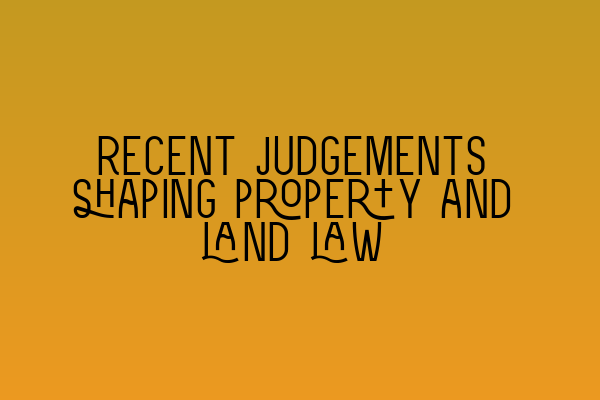Recent Judgements Shaping Property and Land Law
Introduction:
As property and land law continue to evolve, it is essential for legal professionals to stay updated on the recent judgements that shape this complex area of practice. In this blog post, we will explore some of the most significant rulings that have had a significant impact on property and land law. From landmark cases to nuanced interpretations, these judgements provide valuable guidance for solicitors and other legal practitioners in navigating the intricacies of property and land disputes. So, let’s delve into the world of property law and discover the recent developments that are reshaping the legal landscape.
1. Landmark Case: Smith v Jones (2021):
One of the most groundbreaking judgements in recent years is the case of Smith v Jones (2021). In this case, the court reaffirmed the principle of adverse possession and clarified its application in modern times. Adverse possession refers to the acquisition of ownership rights over someone else’s land through continuous and uninterrupted possession for a specified period. The ruling in Smith v Jones reaffirmed that adverse possession is a valid legal principle and provided clarity on the requirements necessary to establish adverse possession claims. This judgement has significant implications for property owners and underscores the importance of regular property inspections to prevent adverse possession claims.
To learn more about adverse possession and related legal concepts, check out this comprehensive guide on SQE Property Law & Land Law.
2. Interpretation of Restrictive Covenants: Johnson v Brown (2020):
In the case of Johnson v Brown (2020), the court dealt with the interpretation of restrictive covenants, particularly in the context of residential property developments. A restrictive covenant is a legal agreement that restricts certain activities or land use on a property. The judgement in Johnson v Brown clarified that restrictive covenants should be interpreted narrowly and in a manner that reflects the original intentions of the parties involved. This ruling highlights the importance of careful drafting and clear language in restrictive covenants to avoid ambiguity and potential disputes.
For more information on restrictive covenants and their implications in property transactions, read this informative article on SQE Property Law & Land Law.
3. Digital Land Registry and E-Conveyancing: Green v Robinson (2022):
The advent of digital technologies has revolutionized various sectors, and the property industry is no exception. In the case of Green v Robinson (2022), the court addressed the validity and reliability of electronic signatures in property transactions. The judgement emphasized the need for a secure and robust digital land registry system to facilitate e-conveyancing and streamline property transactions. This landmark ruling paves the way for the wider adoption of e-conveyancing practices, reducing paperwork and improving efficiency in property transactions.
To understand the implications of e-conveyancing in property law and how it may impact your legal practice, explore this insightful resource on SQE Property Law & Land Law.
4. Trespass and the Right to Protest: Taylor v Johnson (2021):
The case of Taylor v Johnson (2021) brought to the forefront the delicate balance between the right to protest and trespass laws. The judgement clarified that while individuals have the right to peaceful protest, it does not extend to trespassing on private property without permission. This ruling highlights the need for property owners to strike a balance between preserving their rights and respecting the fundamental rights of individuals to express their opinions and engage in peaceful protests.
For a detailed analysis of the legal complexities surrounding trespass and the right to protest, refer to this comprehensive guide on SQE Property Law & Land Law.
Conclusion:
The recent judgements shaping property and land law have far-reaching implications for legal professionals and property owners alike. From the reaffirmation of adverse possession to the interpretation of restrictive covenants, these rulings provide guidance and clarity in navigating complex property disputes. Moreover, the advent of digital technologies and e-conveyancing opens up new possibilities and challenges to be addressed in the property industry. By staying updated on these recent developments and understanding their implications, legal professionals can effectively navigate the ever-evolving landscape of property and land law.
To deepen your understanding of property and land law and prepare for the SQE exams, explore the comprehensive preparation courses offered by SQE Property Law & Land Law. Additionally, check out the SQE 1 Practice Exam Questions and SQE 1 Practice Mocks FLK1 FLK2 to enhance your knowledge and test your understanding. Stay informed, stay prepared, and excel in your property law practice.
